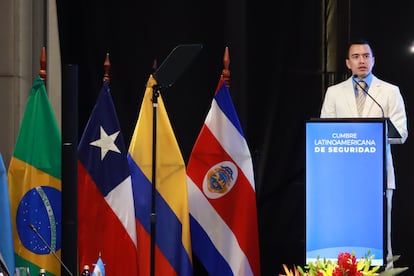Latin America to form regional alliance to stifle organized crime
According to the Inter-American Development Bank (IDB), violence has weakened states, increased the cost of doing business, and costs the region 3.5% of GDP

Organized crime and violence are an obstacle to development and growth in Latin American countries. Security has become one of the main concerns among citizens. According to the Inter-American Development Bank (IDB), violence has weakened states, increased the cost of doing business, and costs the region 3.5% of GDP. The problem is not new and political leaders are aware of it. They agree that criminal groups are more organized, more interconnected, do not respect borders, and that extra efforts are required to combat them. Under these premises, on August 19, the Latin American Security Summit was inaugurated in Guayaquil, one of the most insecure cities in Ecuador, which has registered 1,650 violent crimes so far this year and accounts for 45% of the homicides in the entire country.
“We know that there is no single formula to respond to organized crime, especially when these organizations evolve rapidly,” said Ilan Goldfajn, president of the IDB. Goldfajn proposed creating a regional alliance to strengthen security and justice in the region and to coordinate the implementation of public policies and the mobilization of resources. Argentina, Brazil, Chile, Colombia, Costa Rica, Guatemala, Honduras, Panama, Paraguay, Peru, and Uruguay will join the alliance and Ecuador has committed itself to assume the first presidency. The IDB announced that it will serve as technical secretariat.
The objective is to stifle organized crime through three axes: limiting its influence among the most vulnerable populations, strengthening state institutions, and suppressing its financial flow. The challenge of any project is to mobilize resources. The IDB proposal will support countries with technical assistance, training, scientific data, and technology. “We have to use analysis and intelligence tools based on evidence to know where the crime is, where to concentrate resources, because we are facing more sophisticated groups,” explained the IDB president.
In this regard, the institution also announced in Guayaquil an agreement with the World Bank and CAF - Development Bank of Latin America and the Caribbean to deepen collaboration and cooperation to generate knowledge and support public policies related to transnational organized crime in the countries of the region.
The discussion also revolved around the analysis of the other business axes that organized crime groups use to maximize their illicit profits, and the ease with which they reach markets. “The Gulf Clan was previously only dedicated to cocaine trafficking; now it is involved in migrant smuggling, human trafficking, and we see more groups using illicit mining to launder their assets,” said Candice Walsh, United Nations Office on Drugs and Crime representative for the Andean region, at one of the forums. The host country can attest to this.
Less than a week ago, there was a massacre in a mine in the town of Ponce Enríquez, in the province of Azuay. Six people were killed in clashes between criminal groups fighting for control of the deposit. “A negative effect of globalization is also the globalization of crime; criminal structures are not from one country, nor from one city or neighborhood, but occupy entire regions and have intercontinental logistics chains,” said Daniel Noboa, president of Ecuador and host of the summit.
Another goal is to reduce the opportunities for these groups to recruit children and young people. The IDB announced its cooperation in a program to prevent and respond to violence and crime in Ecuador, similar to the one implemented in Costa Rica and Brazil, to create integrated social service centers for at-risk youth, and a new model of specialized police service. “The IDB must also modernize and change. We must adapt,” added Goldfajn. The different organizations that participated in the forum agreed on the need to implement mechanisms to control the financial flow of criminal organizations. “That is the blood that circulates, and unless we have transparency in financing, we will not have control over the flow and the corruption,” said Tuesday Reitano, deputy director of the Global Initiative Against Transnational Organized Crime.
The Summit will close on August 20, when the context in which organized crime operates will be presented, as well as strategies for prevention and community strengthening in territories affected by criminal violence.
Sign up for our weekly newsletter to get more English-language news coverage from EL PAÍS USA Edition
Tu suscripción se está usando en otro dispositivo
¿Quieres añadir otro usuario a tu suscripción?
Si continúas leyendo en este dispositivo, no se podrá leer en el otro.
FlechaTu suscripción se está usando en otro dispositivo y solo puedes acceder a EL PAÍS desde un dispositivo a la vez.
Si quieres compartir tu cuenta, cambia tu suscripción a la modalidad Premium, así podrás añadir otro usuario. Cada uno accederá con su propia cuenta de email, lo que os permitirá personalizar vuestra experiencia en EL PAÍS.
¿Tienes una suscripción de empresa? Accede aquí para contratar más cuentas.
En el caso de no saber quién está usando tu cuenta, te recomendamos cambiar tu contraseña aquí.
Si decides continuar compartiendo tu cuenta, este mensaje se mostrará en tu dispositivo y en el de la otra persona que está usando tu cuenta de forma indefinida, afectando a tu experiencia de lectura. Puedes consultar aquí los términos y condiciones de la suscripción digital.








































